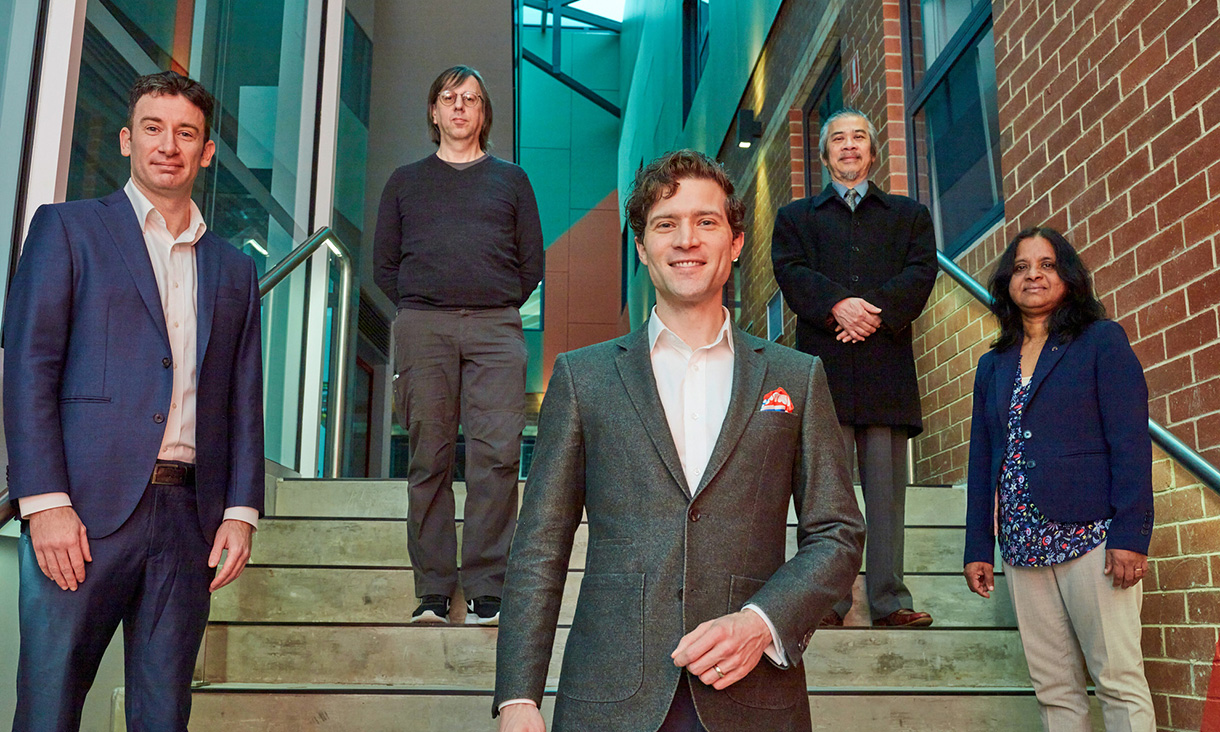mDetect spins out from Swinburne: taking deep tech to new depths

The mDetect team (left to right) Dr Jerome Donovan, Craig Webster, Professor Alan Duffy, Dr Eryadi Masli and Shanti Krishnan.
In summary
- Innovative start-up mDetect has developed a new technology platform that uses particles from space – called muons – to ‘see the unseeable’
- The platform can visualise underground conditions for mining and construction
Innovative start-up mDetect has developed a new technology platform that uses particles from space – called muons – to ‘see the unseeable’, visualising underground conditions for mining and construction companies.
Co-founded by renowned astrophysicist Professor Alan Duffy, mDetect is a spin-out company from Swinburne. It is based on Professor Duffy’s research team’s efforts into measuring subsurface rock structures using muons.
“Muons are heavier versions of electrons, that are made when cosmic rays slam into atoms in Earth's atmosphere,” explains Professor Duffy.
“We have patented new detectors and powerful AI techniques to take an X-ray style scan through solid rock revealing different density structures.”
Joining several other start-ups in Swinburne Innovation Precinct’s Accelerator Program, mDetect received $30,000 seed funding for research and development and has already pitched to an international audience of industry, investors and mentors.
Along with training in intellectual property, marketing, supply chain management and more, the Accelerator Program also provided mDetect and fellow start-ups one-on-one workshops with successful entrepreneurs including Canva’s Cameron Adams.
“mDetect is a great example of the entrepreneurial approach of our staff to innovative and ground-breaking research being undertaken at Swinburne,” Deputy Vice-Chancellor (Research and Enterprise) Professor Bronwyn Fox says.
Executive Director of the Swinburne Innovation Precinct, Dr John Morrison, adds: “I love this company! They are a bunch of astrophysicists that have developed a low-cost solution to see through metres of rock, concrete and steel.
“They are going to change how the world sees mining projects, construction sites and archaeological digs. It will lead to safer and probably faster outcomes for major projects.”
Professor Duffy agrees: “This training turbo-charged our venture from an exciting research product to a commercial offering for the construction and mining industries.
“The $30,000 in seed funding will create the first prototype detectors for deployment to an industry partner’s site, revealing commercial-insights on the subsurface structures.”
Accelerator Demo Day
The company is looking forward to the upcoming Swinburne Accelerator Demo Day on Wednesday 16 September and will actively explore investor partnerships in the last quarter of 2020.
Other start-ups to be featured at the Demo Day are:
- Automation Acoustics enables production consistency through a unique and proprietary industrial monitoring solution
- Fishable creates actionable insights and intelligence using its unique measuring technology to enrich the angling experience and drive sustainable fishing practice
- Little Green Panda is combating the single use plastic crisis in a for-profit manner by mixing innovation and sustainability to create better products
- Milkdrop helps mothers benefit from the power of breast pumps without the pain
-
Media Enquiries
Related articles
-

- Design
- Astronomy
- Technology
- University
Swinburne ‘Rock Muncher’ takes part in Australian Rover Challenge
A multidisciplinary student team from Swinburne University of Technology competed in the 2024 Australian Rover Challenge held in Adelaide, South Australia.
Thursday 11 April 2024 -

- Technology
- Education
- University
From humble beginnings to global impact: what Quitch did next
Dr Grainne Oates transforms Quitch from startup to global powerhouse, redefining education with Swinburne's support.Friday 01 March 2024 -

- Technology
CSIRO and Swinburne level up Australia’s manufacturing sector with Industry 4.0 Testlab
The Testlab has showcased its world-first fully automated industrial-scale production facility using a 3D-printing approach to composite component creation.
Read more (CSIRO and Swinburne level up Australia’s manufacturing sector with Industry 4.0 Testlab )Wednesday 13 March 2024 -

- Technology
World first project could see EVs charge wirelessly on the road
A $3 million grant by the Australian government will implement dynamic wireless charging technology into roads, unlocking the uptake of electric heavy vehicles and saving $324 billion by 2050.
Friday 16 February 2024 -

- Technology
- Science
- Sustainability
- Engineering
CSIRO and Swinburne invest in green steel and mineral processing to help industry get to net zero
CSIRO and Swinburne have established a new partnership to tackle global decarbonisation with innovative green steel and mineral processing research and development.
Thursday 01 February 2024

